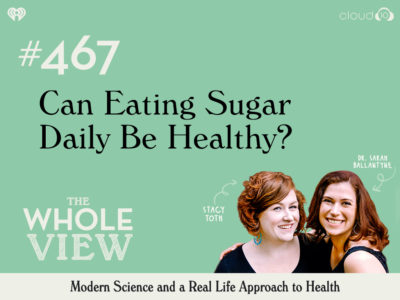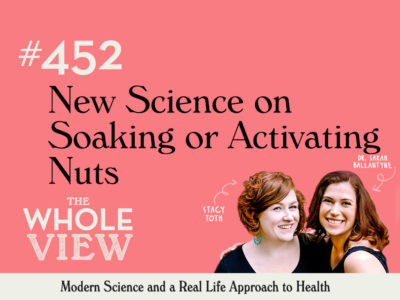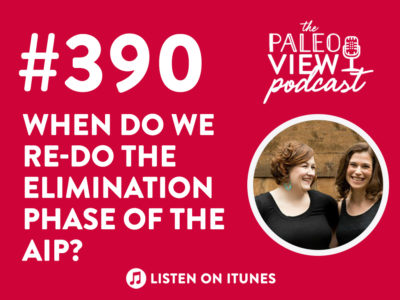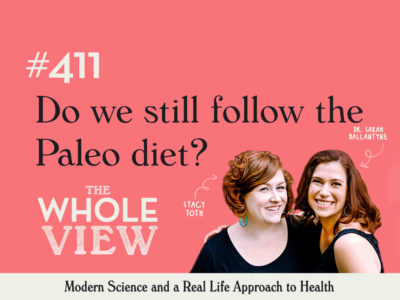This week on The Whole View Podcast, Stacy and I answer listener Grace’s question about eating sugars, candy and sweets. (Grace follows the AIP yet has a sweet tooth!) We first review the science on how eating too much sugar can cause inflammation, deplete certain nutrients, and impact the gut microbiome. And, we discuss the biological contexts that magnify versus mitigate the detriments of high sugar intake. We also discuss how drinking sugar-sweetened beverages with meals leads to overeating. Then, we examine the science showing that moderate sugar consumption (less than 10% of total calories coming from added sugars) doesn’t have those detrimental effects in most contexts. We also talk mindset throughout, and take a balanced no-guilt approach to looking at sugar rather than how sugar is typically demonized in diet culture. Finally, we discuss some real life and practical aspects of this topic, like how sugar is addictive, how fruit is awesome and doesn’t count, how sweeteners are worse than sugar, and why natural sugars like molasses, honey and maple syrup are the best choices.
Table of Contents[Hide][Show]
If you enjoy the show, please review it on iTunes!
Listener Question from Grace
Dear Stacy and Dr. Sarah,
I am a long time fan of your amazing podcast and both of your blogs, and took the AIP lecture series a couple years ago and learned so much. I have listened to the whole series at least three times, and your voices have become like part of my brain now 🙂 I feel so much attachment to both of you, and can’t tell you how much I appreciate the contributions you’ve made to my life.
My problem is sugar. I follow a maintenance AIP and my meals are great — ALL the veggies and seafood and healthy starchy veggies and working on organ meats! — but I have this one kind of ridiculous habit that I haven’t shaken. Namely, I have always been a sugar lunatic. In my twenties, I drank a million diet Cokes a day and ate just hordes of candy, and over the years I have tried to stop eating sugar a number of times but find it so hard. Even during the elimination phase of AIP I struggled — I would eat power balls and have spoonfuls of honey from the jar! Now I’m eating healthier than ever and have for years, but I eat sugar almost every evening — honey in tea, dark chocolate, some paleo treats, and if my kids have candy around, I find it so hard not to eat. I know it is not rational to eat AIP except candy of all things…
Anyway, I’m hoping you might be up for a new sugar show. I feel like maybe I just need to really get why sugar is so bad. I was wondering if you could update on how does sugar affect the microbiome? Inflammation? I am hoping that maybe I can get some info that I can hang my hat on!
Love and appreciate you both so much.
Grace
Key Takeaways
- Sugar in moderation can fit into a healthy diet, but it’s important to emphasize that sugar substitutes are not a good trade.
- The body digests and absorbs sugars quickly. As a result, the glucose they contain has a rapid impact on blood sugar levels and insulin secretion, which shuttles glucose into our cells. Our cells convert glucose into adenosine triphosphate (ATP), the energy currency for all cells.
- And while there are mechanisms that cause all food intake to be inflammatory, there are definitely some sources that are worse than others (i.e., sugar!). Put simply, the more glucose we eat, the more inflammation in our bodies!
- In normal circumstances, antioxidants (certain vitamins and most phytonutrients) balance out the deleterious effects of these highly reactive molecules and inflammation in our bodies. Therefore, if you have a diet that is high in antioxidants, it effectively can cancel out some of the potential inflammation that may be created by glucose and other carbohydrates.
- Excessive consumption of sugars is also linked to several metabolic abnormalities and adverse health conditions, as well as shortfalls of essential nutrients. There are new areas of research however, that are also looking at how sugar affects gut microbiome composition through changes in the balance and diversity of microbes in the gut, and how it alters the growth of bacteria in the gut.
- Eating too much sugar can deplete your body of vitamin D, calcium, magnesium, chromium and vitamin C.
- Staying below 10% of sugar consumption, by calories is well supported by science, and less than 5% would be better for day-to-day. But, remember, that’s 10% added sugar, so fruit doesn’t count toward the limit.
- A lot of how our body responds to sugar is related to nutrient deficiencies and lifestyle. So eating sugar daily in itself isn’t necessarily unhealthy. Instead, it’s how much we’re eating and what foods we’re eating with it.
- Natural sugars, like molasses, maple sugar, cane sugar, and honey, have some good nutrients and are the best choices when craving something sweet.
Recommended Reading and Listening
- 5 Nutrients You’re Deficient In… If You Eat Too Much Sugar
- The Link Between Sleep and Your Weight
- 3 Ways to Regulate Insulin that Have Nothing to Do With Food
- How Does Sugar Fit into a Healthy Diet?
- TPV Podcast, Episode 300: How Do You Handle Sugar and Salt Cravings?
- TPV Podcast, Episode 323: Cheat or Treat, Let’s Talk Sweets!
- TWV Podcast Episode 459: Gluten-Free Baking, Our Best Tips and Tricks
- TPV Podcast Episode 365: Does Paleo Cause Heart Disease?
- TPV Podcast, Episode 329: The Link Between Carb Intolerance & Gut Health
- TPV Podcast, Episode 305: Why Insulin Is Important & Awesome!
- TWV Podcast Episode 437: Intro To Nutrivore
Citations
Avena NM, Rada P, Hoebel BG. Evidence for sugar addiction: behavioral and neurochemical effects of intermittent, excessive sugar intake. Neurosci Biobehav Rev. 2008;32(1):20-39. doi: 10.1016/j.neubiorev.2007.04.019.
Beards E, Tuohy K, Gibson G. A human volunteer study to assess the impact of confectionery sweeteners on the gut microbiota composition. Br J Nutr. 2010 Sep;104(5):701-8. doi: 10.1017/S0007114510001078.
Buyken AE, Mela DJ, Dussort P, Johnson IT, Macdonald IA, Stowell JD, Brouns FJPH. Dietary carbohydrates: a review of international recommendations and the methods used to derive them. Eur J Clin Nutr. 2018 Dec;72(12):1625-1643. doi: 10.1038/s41430-017-0035-4.
Johnson RK, Appel LJ, Brands M, Howard BV, Lefevre M, Lustig RH, Sacks F, Steffen LM, Wylie-Rosett J; American Heart Association Nutrition Committee of the Council on Nutrition, Physical Activity, and Metabolism and the Council on Epidemiology and Prevention. Dietary sugars intake and cardiovascular health: a scientific statement from the American Heart Association. Circulation. 2009 Sep 15;120(11):1011-20. doi: 10.1161/CIRCULATIONAHA.109.192627.
Kumanyika SK, Obarzanek E, Stettler N, Bell R, Field AE, Fortmann SP, Franklin BA, Gillman MW, Lewis CE, Poston WC 2nd, Stevens J, Hong Y; American Heart Association Council on Epidemiology and Prevention, Interdisciplinary Committee for Prevention. Population-based prevention of obesity: the need for comprehensive promotion of healthful eating, physical activity, and energy balance: a scientific statement from American Heart Association Council on Epidemiology and Prevention, Interdisciplinary Committee for Prevention (formerly the expert panel on population and prevention science). Circulation. 2008 Jul 22;118(4):428-64. doi: 10.1161/CIRCULATIONAHA.108.189702.
Marriott BP, Hunt KJ, Malek AM, Newman JC. Trends in Intake of Energy and Total Sugar from Sugar-Sweetened Beverages in the United States among Children and Adults, NHANES 2003-2016. Nutrients. 2019 Aug 25;11(9):2004. doi: 10.3390/nu11092004.
Save 70% Off the AIP Lecture Series!
Learn everything you need to know about the Autoimmune Protocol to regain your health!
I am loving this AIP course and all the information I am receiving. The amount of work you have put into this is amazing and greatly, GREATLY, appreciated. Thank you so much. Taking this course gives me the knowledge I need to understand why my body is doing what it is doing and reinforces my determination to continue along this dietary path to heal it. Invaluable!
Carmen Maier
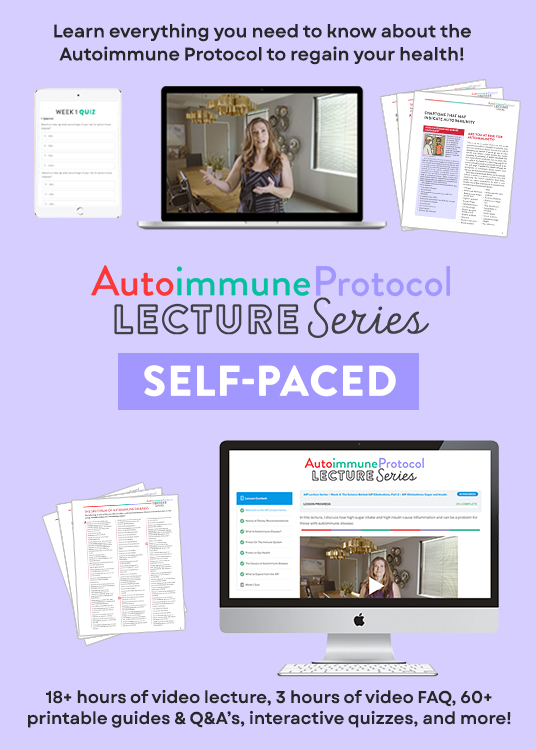
Rippe JM, Sievenpiper JL, Lê KA, White JS, Clemens R, Angelopoulos TJ. What is the appropriate upper limit for added sugars consumption? Nutr Rev. 2017 Jan;75(1):18-36. doi: 10.1093/nutrit/nuw046.
Rosas-Villegas A, Sánchez-Tapia M, Avila-Nava A, Ramírez V, Tovar AR, Torres N. Differential Effect of Sucrose and Fructose in Combination with a High Fat Diet on Intestinal Microbiota and Kidney Oxidative Stress. Nutrients. 2017 Apr 16;9(4):393. doi: 10.3390/nu9040393.
Vartanian LR, Schwartz MB, Brownell KD. Effects of soft drink consumption on nutrition and health: a systematic review and meta-analysis. Am J Public Health. 2007 Apr;97(4):667-75. doi: 10.2105/AJPH.2005.083782.
Volynets V, Louis S, Pretz D, Lang L, Ostaff MJ, Wehkamp J, Bischoff SC. Intestinal Barrier Function and the Gut Microbiome Are Differentially Affected in Mice Fed a Western-Style Diet or Drinking Water Supplemented with Fructose. J Nutr. 2017 May;147(5):770-780. doi: 10.3945/jn.116.242859.
Vos MB, Kaar JL, Welsh JA, Van Horn LV, Feig DI, Anderson CAM, Patel MJ, Cruz Munos J, Krebs NF, Xanthakos SA, Johnson RK; American Heart Association Nutrition Committee of the Council on Lifestyle and Cardiometabolic Health; Council on Clinical Cardiology; Council on Cardiovascular Disease in the Young; Council on Cardiovascular and Stroke Nursing; Council on Epidemiology and Prevention; Council on Functional Genomics and Translational Biology; and Council on Hypertension. Added Sugars and Cardiovascular Disease Risk in Children: A Scientific Statement From the American Heart Association. Circulation. 2017 May 9;135(19):e1017-e1034. doi: 10.1161/CIR.0000000000000439.
Warfa K, Drake I, Wallström P, Engström G, Sonestedt E. Association between sucrose intake and acute coronary event risk and effect modification by lifestyle factors: Malmö Diet and Cancer Cohort Study. Br J Nutr. 2016 Nov;116(9):1611-1620. doi: 10.1017/S0007114516003561.
Yang Q, Zhang Z, Gregg EW, Flanders WD, Merritt R, Hu FB. Added sugar intake and cardiovascular diseases mortality among US adults. JAMA Intern Med. 2014 Apr;174(4):516-24. doi: 10.1001/jamainternmed.2013.13563.


